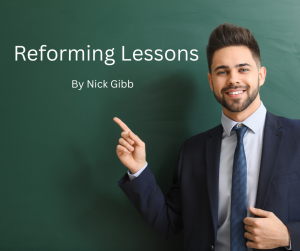A literary recommendation
 Summer ‘reading lists’ are an annual conversation piece amongst politicos and thinkers.
Summer ‘reading lists’ are an annual conversation piece amongst politicos and thinkers.
Self-appointed authorities set these lists to show what direction they think policy should be taking.
I don’t have a list to publish – I have just one book to recommend. And I am hoping that our Education Secretary Bridget Phillipson will have it on her list. Although I suspect she won’t.
I am taking about ‘Reforming Lessons’ by former Minister for Schools, Sir Nick Gibb, which he co-authored with secondary school headteacher Robert Peal.
Trailed in the Telegraph, Gibb details how he and Michael Gove drove through reforms that improved education in England – while the systems in Scotland and Wales failed children because they were underpinned by progressive ideas.
As someone who advised on the 2014 primary maths curriculum, I firmly believe in Nick Gibb’s vision and recognise the bravery and effort that was required to stand up to the progressives and the education ‘blob’.
Quite why an education secretary would look at a system that had markedly improved things and conclude that it needs taking back to the ideas that routinely fail is beyond me.
But that is what I fear Phillipson is doing. She wants to put ideology before evidence.
The education white paper to be published in the autumn will give us more of an idea about what direction she is taking.
There is a real danger that Starmer’s Labour will take us back into the cycle of failure that beset our educational system for decades.
The left see progressivism as the answer to improving the system further and they are completely wrong.
Brave politicians look at the evidence and ditch ideologies that don’t work and continue with those that do.
When the Cameron government took over from Labour it saw the success of the academies programme and continued with it, giving it more capacity to expand.
Here are some of the fundamentals that ought to be self-evident to anyone seeking to continue to improve our education system:
There is a need for structured and knowledge-based learning which is more traditional in its approach.
A model of teaching and school organisation that is based on exploring and adapting to a completely child-centred learning-based approach does not work.
Obviously, in the early years – Reception to Year 2 – learning through play and discovery is important but from Year 3 onwards there needs to be a structured curriculum with clear learning objectives.
Children should be taught the four rules of number, decimals and fractions, percentages and ratios in a clear pattern of study.
This does not mean children learn by rote because they are constantly engaged with problem solving. They learn the algorithms that form the heart of mathematical understanding.
They must also learn their times tables to develop their number bonding skills and how the number system works.
Children should be taught grammar, syntax and punctuation and should develop their comprehension, spelling and vocabulary skills. All this needs to be coupled with a challenging reading programme.
The teaching of ‘phonics’ is also of great importance. It is proven to work, and the methodology gives a structured method for children who are having more difficulties with reading.
Primary education needs to deliver!
At the end of the primary years children should be proficient in literacy and numeracy because secondary education is subject based and it is more difficult to tackle problems children are having with basic literacy and numeracy.
Failure in numeracy leads to problems not only in maths but also in chemistry, physics and design and technology.
Failure in literacy leads to problems in every subject area.
This is why the curriculum had to change in 2014 to bring about real progress in literacy and numeracy and to counteract the effects of the progressivism that had gripped the educational establishment for decades.
Let us not return to those dark days of progressive educational methods of child-led learning, a lack of structured and knowledge-based learning, and a failure to teach the crucial building blocks of numeracy and literacy.
ends